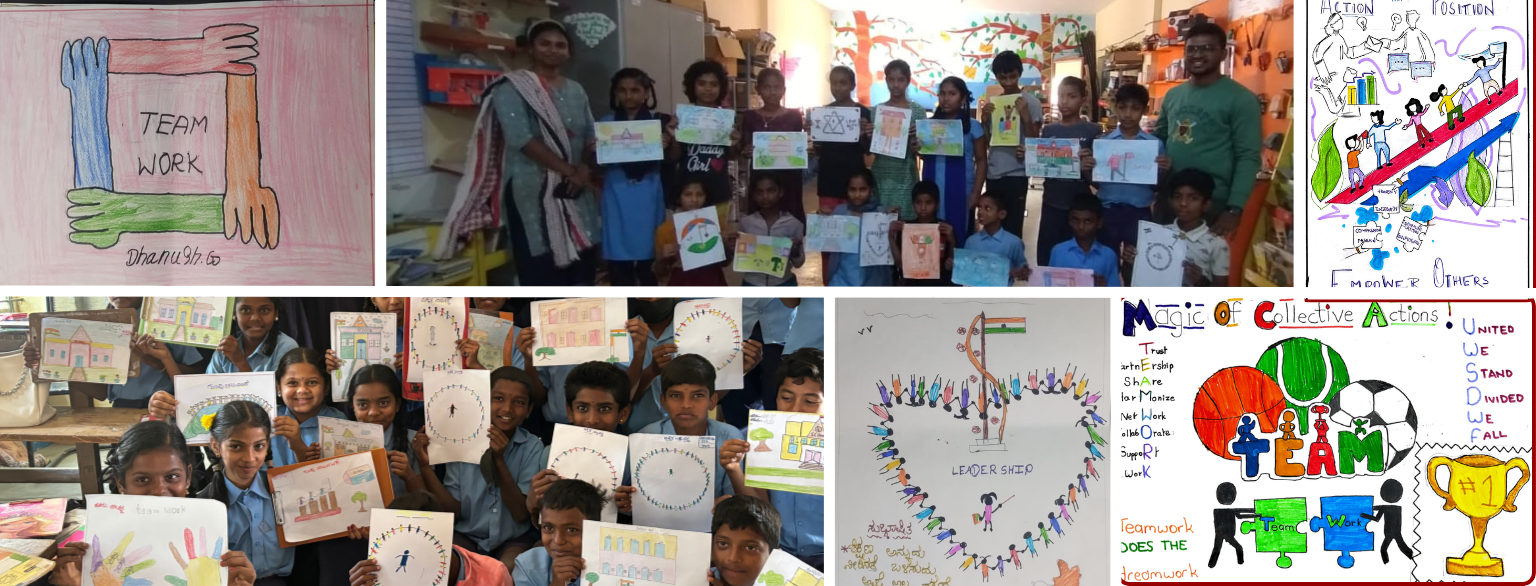
What Puts Orchestrating Collective Action at Risk?
Drawing Lessons from the Collapse of Communism
In today’s world, societal challenges like quality education, climate change, inequities etc. loom large, affecting billions of lives worldwide. These issues are complex and multifaceted, spanning across communities, regions, and even continents. The sheer scale of these challenges is daunting, making it clear that no single entity—whether government, NGO, or community group—can hope to solve them alone.
The Context
My work at ShikshaLokam and Mantra4Change is single-mindedly focused towards improving the quality of education for our children in India, thus shaping a more equitable world in the future. Data from the National Achievement Survey (NAS) shows that hundreds of millions of children in our country still lack access to quality education, perpetuating cycles of poverty and inequality. The World Bank and the UNESCO Institute for Statistics are talking of a growing ‘Learning Poverty’. To me, my team and several of our partners, it’s evident that collective action is needed to address these issues comprehensively and effectively; and yet it’s baffling how tedious this orchestration of collective action gets, at times.
Being a history buff, I had always been curious about the insights history has to offer while we embarked on this journey of orchestrating collective action. So we started reading about social movements.
Last month, I got a unique opportunity to be in a week-long course on ‘Leadership for Systems Change’ at the Harvard Kennedy School with 40 other wonderful social change leaders as part of the Schwab Foundation community. The discussions during each of the sessions were rich and thought-provoking. It was during one of these sessions that it suddenly dawned on me – there might be many lessons from Communism that we can gain insights from!
Disclaimer: I’m no expert on communism; and I’m an early-stage practitioner of collective action.
Communism and its Principles
Communism espouses the ideas of collective ownership, cooperation and worker empowerment. However, we know, that despite its high ideals and the best intentions to promote equality and solidarity, the communist system failed to eradicate disparities. Communism carries lessons about bureaucracy, inefficiency, and deteriorating performance because of the ‘that’s good enough’ attitude.
I remember reading an excerpt by Karl Marx that said, “We call communism the real movement which abolishes the present state of things. (…) Society does not consist of individuals, but expresses the sum of interrelations, the relations within which these individuals stand.” This makes perfect sense. In fact, in our design, we keep emphasising on the interrelations and interdependencies.
So, the question that I have in my mind is – how can we – as orchestrators of collective action and as people with the best of intentions – avoid such pitfalls and design effective collective action initiatives to address sticky societal challenges? Here are my initial reflections.
Balancing Collective Vision with Individual Innovation
Communism often centralised decision-making, thus hindering individual creativity and innovation. Leaders believed they had the benign vision and hence, all the answers, leaving little room for experimentation or deviation from the party line. This rigidity meant that communist economies were ill-equipped to respond to changing circumstances or emerging challenges, ultimately leading to stagnation and decline.
In contrast, in our work, effective collective action must strike a balance between a shared vision for change, implemented with a robust long-term plan, and creating room for innovative solutions. However, the latter often gets compromised at the risk of being considered a distraction.
We must ask ourselves if we are embracing a culture of innovation, rapid prototyping, experimentation, and continuous learning. What we need to do is to encourage diverse perspectives, embrace new technologies, and create space for creativity and risk-taking. Only by remaining adaptable and open to new ideas, we can develop more effective and sustainable solutions to complex challenges.
Ensuring Transparent Governance, Accountability and Adaptability
Communist regimes often lack transparency and accountability, leading to corruption and abuse of power. Decisions were made behind closed doors without input from the people they purported to represent. Initially, this may have been with the intention of expediting certain decisions, but it soon turns into a habit, when unchecked.
Hence, in successful collective action initiatives, we must prioritise transparency and accountability at every level. We should establish mechanisms for clear reporting, monitoring, and evaluation, allowing stakeholders to track progress and hold each other accountable. By fostering a culture of openness and integrity, we can build deeper trust among partners, and ensure that resources are used effectively to achieve shared goals. Also, with built-in mechanisms for feedback, evaluation, and course correction, we can continuously refine strategies and approaches, and thus be more resilient to emerging challenges.
Restoring Agency among Local Communities
Centralisation was a common feature of communist systems, with decisions made at the top levels and imposed upon local communities without their input or consent. The individual agency was feared and discouraged. This top-down approach often led to a disconnect between decision-makers and the people they were meant to serve.
To avoid this, we must keep ‘Agency’ at the core of our design of collective action efforts. When we design for community empowerment and participation, involve local stakeholders in decision-making processes, respect their knowledge and expertise, and co-create and prioritise solutions that are tailored to their unique contexts, we enable communities to take ownership of initiatives.
We must also invest in capacity-building initiatives to strengthen grassroots organisations. This ensures that interventions are relevant, sustainable from inside-out, and impactful.
Incentivising Pursuit of Excellence
Communism often led to bureaucratic red tape and inefficiencies. In the garb of collective performance, it is easy for a pervasive sense of complacency to set in. With no incentives to reward innovation or hard work, many people began to adopt a “good enough” mentality and were content to meet the minimum requirements rather than striving for excellence.
In our work with the system as a collective, we often speak about contribution to the impact versus attribution of impact. Now what do we need to keep in the center of our design efforts such that every actor/partner/institution puts their best efforts towards making the desired collective impact? While intent and trust exist, collective action initiatives should also prioritise streamlined processes, clear communication channels, and transparent performance reviews. Incentives have to be thoughtfully designed for the pursuit of excellence.
Embracing Diversity and Inclusivity
Communism often suppressed dissenting voices and marginalised groups, leading to social divisions and tensions. They may have feared that alternative perspectives could undermine the authority of the ruling party.
At several points, we often find ourselves in a similar echo chamber. To build truly inclusive collective action initiatives, we must embrace diversity, participatory approaches and ensure that all voices are heard and valued. We need to proactively create platforms for dialogue, collaboration, and consensus-building, where stakeholders from different backgrounds can come together to co-create solutions. This comes at an initial cost of time. Discussions become long and we often find ourselves thinking – ‘are we compromising on speed?’ My colleague and I have written about the dilemmas of collective action earlier. (Read here)
But since it is a marathon, we need to celebrate diversity and foster a sense of belonging. This enables us to build stronger, more resilient communities capable of addressing complex challenges like education equity, even in our absence in the future.
Conclusion
As Prof.Julie Battilana shared with us at Harvard, “Power derives from controlling access to resources others value.” In the collectives, money, decision-making, access to network etc. are those valued resources. Thus, by embracing principles of empowerment, inclusion, accountability, and innovation, we can certainly orchestrate effective collective action.
An Invitation to contribute reflections and solutions
My work has taught me that instead of perfection, one should seek iteration and contribution. So my dear friends, if these lessons resonated with you, or triggered certain contradictory thoughts, I extend an invitation to you to share those with me. Also, if you have developed certain tools and practices that are helping you orchestrate collective action effectively, please consider sharing them as links in comments.
Gratitude to Tasso Azevedo, MapBiomas for review and edits.
The pictures used in this blog are part of the artwork submission received for the ‘Art Experiment on Collective Action’ during InvokED 3.0. These art pieces bring out students’ views on collective action, leadership and their idea of an ideal school.
Meet the Author

Khushboo Awasthi
A management professional turned education enthusiast, Khushboo is the Co-Founder & Chief Operating Officer of ShikshaLokam - an education leadership catalyst and Mantra4Change, a non-profit driving systemic public schools transformation in the Indian education system. With 13+ years of diverse experience in education and healthcare domain she is recipient of Women Transforming India Awards 2021 instituted by NITI Aayog, a Schwab Social Innovator of the Year 2023 and is part of BW Education 40 Under 40 Power List 2022. Khushboo is a travel enthusiast, a curious learner and an avid reader. Her interests lie in exploring concepts of agency, networks, large scale social movements and societal role of technology in encouraging co-creation and collaboration.

Khushboo Awasthi
A management professional turned education enthusiast, Khushboo is the Co-Founder & Chief Operating Officer of ShikshaLokam - an education leadership catalyst and Mantra4Change, a non-profit driving systemic public schools transformation in the Indian education system. With 13+ years of diverse experience in education and healthcare domain she is recipient of Women Transforming India Awards 2021 instituted by NITI Aayog, a Schwab Social Innovator of the Year 2023 and is part of BW Education 40 Under 40 Power List 2022. Khushboo is a travel enthusiast, a curious learner and an avid reader. Her interests lie in exploring concepts of agency, networks, large scale social movements and societal role of technology in encouraging co-creation and collaboration.
